APS Spotlight
2023 APS Lifetime Achievement Awards Honor 13 Psychological Scientists
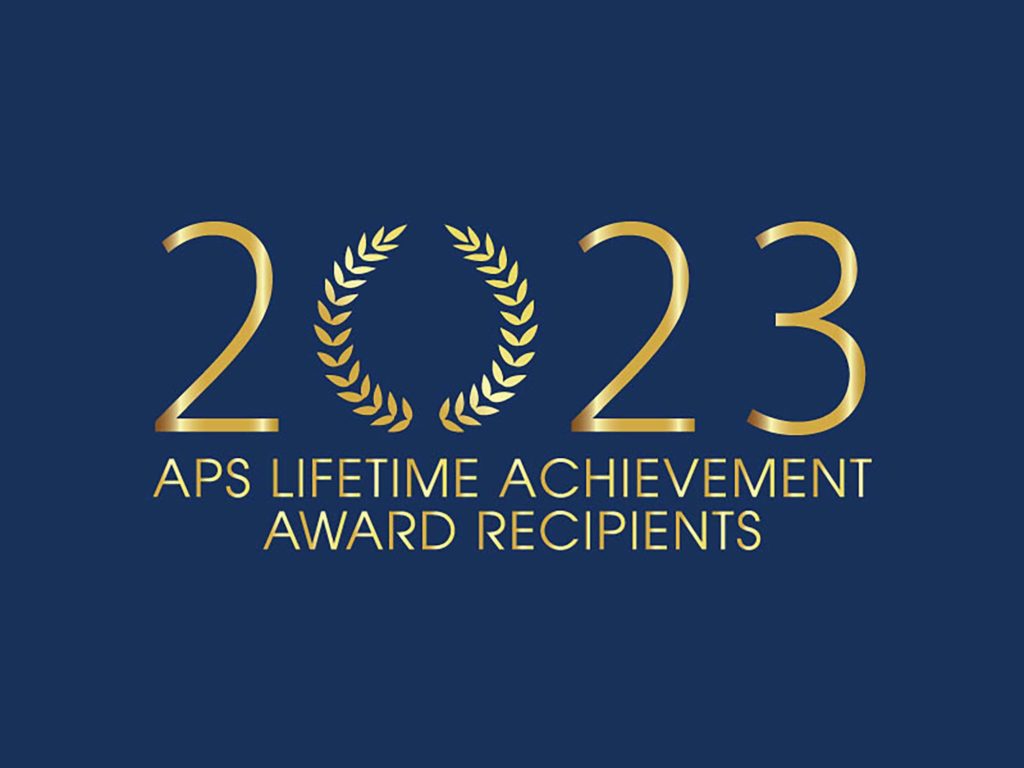
James McKeen Cattell Fellow Award • James S. Jackson Lifetime Achievement Award for Transformative Scholarship • Mentor Award • William James Fellow Award
Thirteen scientists whose contributions have advanced understanding of topics from anxiety and fear to team effectiveness have been selected as recipients of the 2023 APS Lifetime Achievement Awards. The association’s highest honors, created in 1992, the Lifetime Achievement Awards recognize distinguished psychological scientists for their contributions to psychological research and the field. The 2023 awards will be presented at the 2023 APS Annual Convention in Washington in May.
The 2023 APS Janet Taylor Spence Award for Transformative Early Career Contributions will also be presented then.
APS James McKeen Cattell Fellow Award
Honoring APS members for their lifetime of significant intellectual achievements in applied psychological research and their impact on a critical problem in society at large.
Gene H. Brody
University of Georgia

Gene Brody is a Regents’ Professor in the Center for Family Research at the University of Georgia. His work has changed the landscape of developmental, health, and prevention science by demonstrating its potential for narrowing social and racial disparities in health and well-being. In addition, his prospective investigations of resilience among Black Americans have set a standard for conducting research with historically underrepresented populations that focuses on strengths rather than deficits and uses ecologically and culturally sensitive methods.
Beginning in the late 1980s, he pioneered investigations of resilience in human development through a series of longitudinal, ecologically informed studies of family life for rural Black families, who often face racial discrimination, restricted educational and employment opportunities, barriers to physical and mental health care, and limited public transportation. Despite environmental stressors, many youths in his studies demonstrated academic competence, planful self-regulation, and positive psychological adjustment across adolescence. Brody identified naturally occurring factors in family and community networks that buffered these youth from the consequences of chronic environmental stress which included distinct parenting styles, extra-familial support systems, and racial socialization practices.
Brody is also renowned for the development of family-centered prevention programs that deter youth engagement in risky activities and promote mental and physical health. These programs have been embedded in communities across the nation. No less notable are his theoretical contributions to psychology, wherein he demonstrated how resilience is only “skin-deep” for some Black youth. These young people achieve success by all conventional markers: doing well academically, staying out of trouble, and developing a positive sense of self. Underneath, however, their physical health often shows signs of biological wear and tear. They are at substantial risk for developing diabetes, cardiovascular disease, hypertension, and shorter life expectancies. For these young people, resilience can be a double-edged sword promoting psychosocial competence but exacting costs to their physical health.
Michelle G. Craske
University of California, Los Angeles
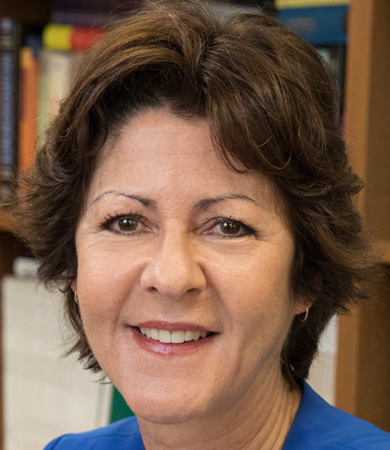
Michelle Craske is a professor of psychology and of psychiatry and biobehavioral sciences at the University of California, Los Angeles (UCLA). She is also director of UCLA’s Anxiety and Depression Research Center and co-director of the UCLA Depression Grand Challenge. A leading clinical scientist working in the broad area of fear, anxiety, and depression, her extensive list of publications includes more than 570 peer-reviewed journal articles as well as many academic, clinical, and self-help books and guides.
Throughout her career, Craske has demonstrated dedication, creativity, productivity, and collegiality in her administrative, research, and teaching and mentoring roles. For instance, she was recruited in the early 1980s for a post-doctoral position at a phobia and anxiety disorders clinic at the State University of New York at Albany. She soon found herself running the clinic, with great success, overseeing more than 300 admissions a year and a variety of research projects supported by a large grant budget.
Her early research on panic, fear, and avoidance paved the way to eventual international recognition in the form of funding from organizations, honorary appointments at universities, and collaborations with colleagues in many countries. Since 1993, she has received extramural funding for research projects pertaining to risk factors for anxiety and depression among children and adolescents, neural mediators of emotion regulation and behavioral treatments for anxiety disorders, fear extinction translational models for optimizing exposure therapy, novel behavioral therapies targeting reward sensitivity and anhedonia, and scalable treatment models for underserved populations. As co-director of the UCLA Depression Grand Challenge, she developed the STAND (screening, tracking and treating anxiety and depression) program providing students with free and accessible mental health resources.
Also noteworthy are Craske’s work on emotional disorders in women and in disseminating and implementing evidence-based treatments in primary-care settings. Her 2003 book, The Origins of Phobias and Anxiety Disorders: Why More Women Than Men is a landmark work guiding research in this area. Among other things, she has developed models of cognitive behavioral therapy for specific anxiety disorders and specific segments of the population, including people who are unemployed, and novel treatments using virtual reality technology.
Eduardo Salas
Rice University
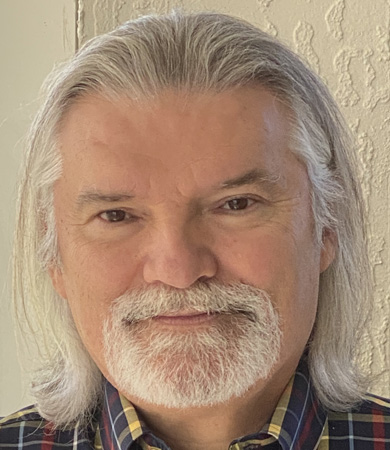
A leading expert in the area of team science, Eduardo Salas is a professor and Allyn R. and Gladys M. Cline Chair of Psychology at Rice University. His work developing evidence-based principles to help organizations design, develop, deploy, and manage teams has resulted in significant benefits to society and multiple applied domains. The broad impact of his work is demonstrated in projects with multiple government agencies and industries including aviation, law enforcement, disaster management, space exploration, and health care.
Salas’s research seeks to uncover what facilitates teamwork and team effectiveness in organizations; how and why team training works; how to optimize simulation-based training; how to design, implement and evaluate training and development systems; how to create a safety culture; and how to generate evidence-based guidance for those in practice. He is well known for the translation of science into evidence-based best practices for applied audiences. One program designed to improve communication and other teamwork skills in health care has reduced medical errors and saved lives, for instance, and others have improved training and safety in the aviation industry.
A prolific scholar, Salas has published at least 400 journal articles, 36 edited books, 247 book chapters, and two authored books, many involving team dynamics, teamwork, learning, and training. His work has had substantial impacts in multiple domains, as evidenced by more than 115,000 citations in journals covering a wide range of topics beyond psychology, such as management, anesthesiology, communication, education, human resources, leadership, medicine, marketing, human-computer interaction, and manufacturing.
Salas has also received significant funding throughout his career—more than 80 grants so far in excess of $61 million. He has used this funding to support his PhD students for many years, and the majority of his publications have one or more of his students as a co-author.
APS James S. Jackson Lifetime Achievement Award for Transformative Scholarship
Honoring APS members for their lifetime of outstanding psychological research that advances understanding of historically disadvantaged racial and ethnic groups and/or understanding of the psychological and societal benefits of racial/ethnic diversity, equity, and inclusion.
Launched in 2022, this award pays tribute to James S. Jackson, a pioneering social psychologist known for his research on race and ethnicity, racism, and health and aging among Black Americans. Jackson died on September 1, 2020, following a nearly 50-year career at the University of Michigan. Read tributes to James Jackson from the December 2020 Observer.
Sandra Graham
University of California, Los Angeles
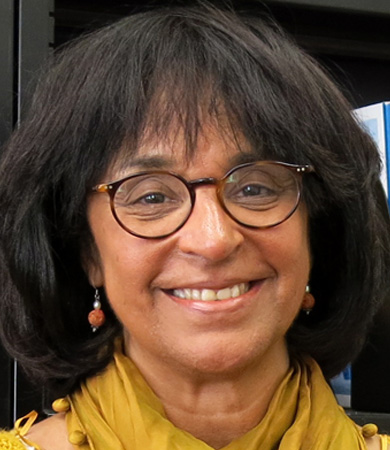
Sandra Graham is the Distinguished Professor and Presidential Chair in Education and Diversity in the Department of Education at the University of California, Los Angeles (UCLA). Known for her scholarship at the intersection of educational, developmental, and social psychology, she has made major contributions to the studies of motivation, aggression, bullying and peer victimization, ethnic diversity, and intergroup relations, with a focus on children of color. She has also contributed to important interventions and policy reforms affecting youth, including advising on school zero-tolerance policies, violent video games, and juvenile justice.
Having taught public school before getting her PhD, Graham developed a particular interest in students who have motivational challenges. She started her research career by examining the social context of attributions in the classroom, observing that certain teacher reactions (e.g., sympathy after poor performance, praise for an easy task) can undermine students’ motivation by suggesting that they have limited ability. Her innovative experimental research helped pave the way to large-scale motivational interventions that are in use today, such as attribution retraining of college students and mindset or “wise” interventions used to improve engagement and achievement of K–12 students.
Graham has also focused on the connection between academic and behavioral problems, including aggression, peer victimization, and self-blame. Her research with African American boys, who are overrepresented among those labeled as aggressive, yielded findings on how the cycle of hostile responding can be exacerbated. This led to the development of short-term attributional intervention focused on social skills and achievement motivation. In the area of bullied youth, her research included a 2006 article arguing that one psychosocial benefit of ethnic diversity in schools is that it provides enough attributional ambiguity to ward off self-blaming tendencies.
Along with conducting research on ethnic diversity, Graham is a thoughtful, passionate, and effective force for greater representation within the field. She has long championed issues of diversity, equity, inclusion, and access through her service on review panels and committees and, as a teacher and mentor, she has inspired many psychology students and a remarkable number of notable Black women scholars.
Janet E. Helms
Boston College
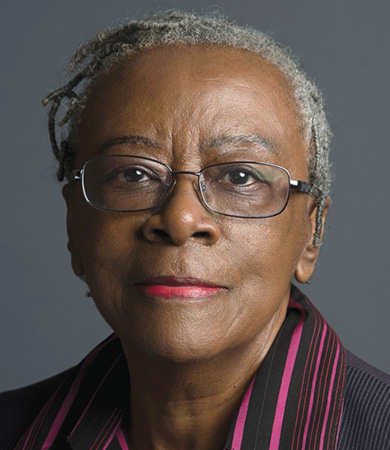
Janet Helms is the Augustus Long Professor Emeritus in Measurement and Assessment in the Department of Counseling, Developmental, and Educational Psychology at Boston College, where she was also the founding director of the Institute for the Study and Promotion of Race and Culture. Her pioneering work on racial identity, multiculturalism, and social justice has influenced generations of researchers and practitioners, and several of her contributions—including her foundational theory on Black and White racial identity and her focus on White self-reflection as crucial to the development of an antiracist White identity—have been woven into the fabric of mainstream conversations on race.
Helms’s decades of scientific leadership include her breakthrough 1984 proposal of a racial identity interaction model for therapy processes and outcomes. Her longstanding commitment to science communication is also evidenced by her popular books, including Black and White Racial Identity: Theory, Research, and Practice, from 1990, and the 2022 McGuffey Longevity Award winning book, A Race Is a Nice Thing to Have: A Guide to Being a White Person or Understanding the White Persons in Your Life, published in 1992 and now in its third edition.
Helms’s additional contributions to the field are vast. As a leader of the Culturalist perspective, she argued that the traditional “nature versus nurture” dichotomy excluded the roles of racial and cultural socialization, particularly when it is used to explain racial or ethnic group differences. Over the years, she became a leading researcher on the validity of standardized assessment tools for admissions decisions, including calling attention to the people doing the research.
In a career marked by tireless service to improve the field, she has also long advocated against structural racism within it, demonstrating how the racial identity of predominantly White researchers, for example, affects the design and interpretation of research on race and ethnicity.
APS Mentor Award
Recognizing APS members who have significantly fostered the careers of others, honoring those who masterfully help students and others find their own voices and discover their own research and career goals.
Mahzarin R. Banaji • Stephen P. Hinshaw • Ellen M. Markman • Nora S. Newcombe • Robert M. Sellers
Mahzarin R. Banaji
Harvard University

Mahzarin Banaji is the Richard Clarke Cabot Professor of Social Ethics in the Department of Psychology at Harvard University. Best known for her work popularizing the concept of implicit bias, she spearheaded (with her mentor Tony Greenwald and her student Brian Nosek) the movement to illuminate the ways in which the social world imposes structure and value on the individual’s conscious and nonconscious mind. This led to the development of the Implicit Association Test, the founding of Project Implicit, and her expansion of the science to understand the neural basis of implicit bias, its emergence in young children, and today, its presence in large language corpora.
As a mentor, Banaji’s influence has changed countless lives and careers for the better. Advisees single out her rigor and high standards, her clarity and courage, her patience and tenacity, her hands-on collaboration, and above all her visionary belief in their potential—even when they doubted themselves. “No idea was off limits, dividing lines between subfields were designed to jump over, the science led the way, and we challenged each other over wine and good food,” wrote one nominator. “It is simply impossible to consider my own career trajectory without centering the incomparable role Mahzarin played in my intellectual development and professional success,” wrote another.
On more than one occasion, dozens of former lab members and their families cleared their calendars and traveled long distances to join lab reunions, or “Camp Banaji.” “By day we hiked and whale watched, and by night we had salon style conversations about the state of the field,” one attendee recalled. “Ideas were sprouted at 2 a.m. that turned into award-winning enterprises a decade later. The creation of this collective, this community—this is mentorship at its finest.”
Stephen P. Hinshaw
University of California, Berkeley; University of California, San Francisco
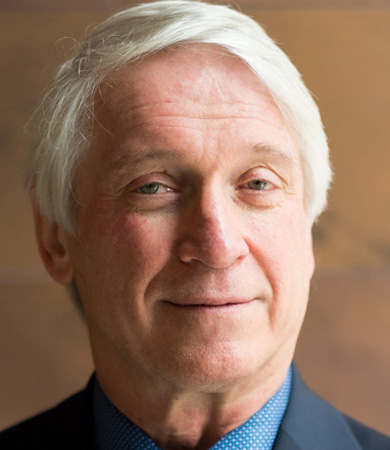
Stephen P. Hinshaw is Distinguished Professor of Psychology at the University of California, Berkeley and a professor of psychiatry and behavioral sciences at the University of California, San Francisco. His work focuses on developmental psychopathology, mental illness stigma, and clinical interventions with children and adolescents, especially those with externalizing behavior dimensions and disorders. As an eminent researcher, collaborator, and advocate in the mental health field, his accomplishments include authoring hundreds of articles and chapters plus 13 books, and founding the Berkeley Girls with ADHD Longitudinal Study, the largest study of its kind.
Former students and advisees, many of whom are developmental psychopathology investigators and professors, credit Hinshaw’s guidance and support—academic and emotional—as the bedrock of their growth and success in the career paths of their choosing, exemplifying the qualities of a great mentor. They remember his inspiring and popular classes, his “encyclopedic knowledge of basic science and quantitative methods,” and his infectious thrill in charting new scientific territory. They also cite his warmth and ready availability, and his astonishingly speedy and thorough responsiveness. Echoing a recurring theme, one nominator wrote, “On numerous occasions, I sent Steve lengthy manuscripts or other documents late at night and received thoughtful and complete feedback by 7 a.m. that very next morning! … I cannot stress how helpful it is as a graduate student to receive such timely feedback on my questions, issues, initiatives—and manuscripts—which in turn allowed me to be much more productive (and responsive to others).”
Ellen M. Markman
Stanford University
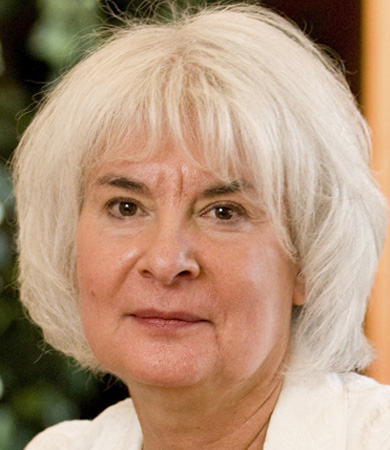
Developmental psychologist Ellen Markman is the Lewis M. Terman Professor of Psychology at Stanford University. Her research interests include the relationship between language and thought, early word learning, categorization and induction, theory of mind and pragmatics, implicit theories and conceptual change, and how theory-based explanations can be effective interventions in health domains.
Markman’s impact on the field of developmental psychology includes not only the degrees and appointments her former advisees went on to secure but also their success forging innovative new research directions and teaching others. They credit this to her insightful analysis, her probing but respectful critiques, her creative approach to research questions—and, in particular, her skill pushing students to improve their thinking and hone their ideas. “You walk into a meeting with Ellen convinced you have a house, and you walk out with a doorknob,” one nominator recalled being told by a fellow advisee. “Granted, it’s the most beautiful, polished doorknob you could possibly imagine, but you thought you had a house!”
Another hallmark of Markman’s mentoring influence is intellectual generosity, to the degree that some graduate students in her cohort called her “Ellen Remarkable.” “Ellen is devoted to her students, wherever they are in their careers and whatever career paths they follow,” wrote one former advisee. This generosity extends to personal issues as well, including students’ financial difficulties and challenging life transitions. “The personal connection that Ellen forged with me also made me realize (especially after I started mentoring my own students) how critical it is to treat students as whole people who are trying to figure out their lives rather than interacting with them just in their capacity as research collaborators.”
Nora S. Newcombe
Temple University

Nora Newcombe is a Laura H. Carnell Professor of Psychology at Temple University. Marked by theoretical grounding and methodological soundness, her research has contributed greatly to our understanding of spatial development and navigation.
As a mentor, Newcombe’s gifts fall into three categories: scientific, career, and personal. She is “approachable, inspiring, curious, warm, kind, and she knows when to provide a patient ear and when to lend sage advice,” one advisee wrote. Others credit her with facilitating a multitude of connections and opportunities extending well beyond the United States. “As a result of her international perspective, she is very aware of the different conditions and academic traditions in other countries, which also enables her to provide valuable career advice across borders and makes her a highly resourceful mentor for international scholars.”
Newcombe is also lauded for exemplifying healthy professional behavior and being notably supportive of women and students from underrepresented or disadvantaged groups. “She is incredibly productive without seeming to get stressed out—or stressing her trainees out by expecting long hours to continuously push out products,” wrote one mentee. Another singled out “her understanding and outright support of balancing the pursuit of science with living your life. Especially as a woman in science, the idea of starting a family can seem unrealistic at best or even ‘career suicide’ …. But I always knew I had an ally in Nora.”
Robert M. Sellers
University of Michigan
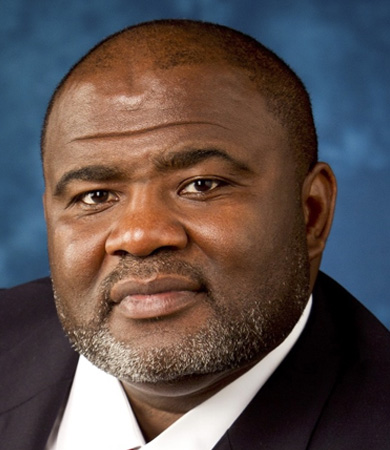
Robert Sellers is the Charles D. Moody Collegiate Professor of Psychology and a professor of education at the University of Michigan. His seminal work on Black racial identity and its role in buffering against the harmful effects of racial discrimination has greatly advanced the field of Black psychology, psychology’s understanding of the Black experience, and the representation of Black scholars within psychological science.
Sellers “is the most sincere, effective, and generative mentor I have known,” wrote one former student. This work began during his own graduate years when he helped develop a program for undergraduate students of color, introducing them to the ins and outs of graduate life, giving them tips on how to compile an effective application, and helping them think about career choices more broadly. That program continues 30 years later. In another large-scale mentoring effort, he is one of the founders of the Black Graduate Conference in Psychology, providing graduate students with access to high-quality feedback on their work, intense professional development, and access to a network of successful academics. In addition, he cofounded the Center for the Study of Black Youth in Context, developing a mentoring plan that includes a strong focus on preparing students and post-docs of color for academic jobs.
In his direct mentoring of individual doctoral students and fellows, Sellers epitomizes high standards and great compassion alike. He prepares his students to develop programs that make a difference in the world, supports them through personal struggles, and helps them understand and navigate academic spaces as well as the job market. In so doing, he demonstrates rare selflessness and generosity. “When I was on the job market, he flew across the country from his sabbatical to help me with my practice job talk,” a former mentee recalled. Remarkably, “he provides this same level of personal attention to numerous others.”
APS William James Fellow Award
Honoring APS Members for their lifetime of significant intellectual contributions to the basic science of psychology.
Kent C. Berridge
University of Michigan

The James Olds Distinguished University Professor of Psychology and Neuroscience at the University of Michigan, Kent Charles Berridge is a neuroscientist and psychologist focused on improving understanding of the neural mechanisms of emotion, motivation, learning, and reward. His seminal research demonstrated that the neural circuitry mediating wanting (mesolimbic dopaminergic pathways) is different from the circuitry mediating liking (nondopaminergic pleasure hotspots). This distinction helped to redefine the field of affective science and advance interventions for conditions including gambling, drug addiction, and alcoholism.
Berridge developed a body of research that successfully challenged many deeply held views of brain-behavior relationships in psychology. His research is also rooted in neuroethology— based on the notion that observing how a brain produces natural affective reactions and real behavior patterns can give insights into underlying psychological processes. Indicators of his influence and impact include more than 78,000 citations, and over a dozen papers with greater than 1,000 citations.
In addition, Berridge is a generous scholar who has collaborated with colleagues in many fields. To this day, his research pushes the boundaries of how the brain maps and interprets pleasure and fear, desire and addictions, and integrates these with emotions. Research in his laboratory addresses a wide range of fundamental questions about the brain and psychology, including how pleasure is generated, what causes addiction, and how the neurobiology of fear relates to the neurobiology of desire.
Angela D. Friederici
Max Planck Institute for Human Cognitive and Brain Sciences

Angela D. Friederici is internationally recognized for her groundbreaking research that advances the understanding of topics such as the neural basis of language, how the human brain processes and acquires language at different stages of development, and functional similarities and dissimilarities between language and music processing. A founding director and professor at the Max Planck Institute for Human Cognitive and Brain Sciences, her multidisciplinary approach to research incorporates findings from such diverse disciplines as neurology, neuroanatomy, and imaging sciences.
Friederici has used a variety of methods ranging from lesion studies to neural imaging techniques and has tested individuals across the lifespan to transform the understanding of language networks in the brain. Early in her career, she established the functional autonomy of the syntactic system and its relative independence from semantic processes. In behavioral studies with healthy participants, she showed that function words, which mainly carry syntactic information, were processed differently from content words carrying semantic information. She later moved to event-related potential (ERP) studies and pioneered the development of novel paradigms for investigating the time course of syntactic processing in auditory language comprehension.
Through her theoretically guided and empirically meticulous work, Friederici has advanced a sequenced model of language processing in the brain and in development, wherein analysis and processing at one level feeds information to the next level. Key to her work is the notion that linguistic experience and brain maturation work together to establish these networks.
Friederici has published nearly 500 peer-reviewed journal articles that are highly cited. She has fundamentally changed the understanding of language processing in the brain, and, in so doing, launched a generation of scholars around the world.
Vonnie C. McLoyd
University of Michigan

Vonnie McLoyd is an Ewart A. C. Thomas Professor of Psychology at the University of Michigan, where she also received her master’s and PhD degrees. Her groundbreaking research in child development began as an undergraduate at Talladega College, Alabama’s oldest private historically Black liberal arts college, where her first research project focused on the Black children who—barred at the time from the town’s public library—used a children’s library at the college. In the decades since, she has significantly advanced knowledge and social policy about the impacts of poverty and racism on the psychological development of young children and has inspired scores of young researchers.
McLoyd examines social variables in detail to understand their contributions to the ways in which individuals grow and change. She pioneered attempts to describe the psychological processes through which economic deprivation influences Black families and children, and her work has guided the development of effective prevention and intervention programs for Black communities. New Hope, for instance, an innovative approach to reducing poverty that launched in Milwaukee, Wisconsin in 1994, explored how viable income, financial security, and full-time employment could affect well-being, parenting, family life, and children’s development among lower-income families. Among her dozens of highly cited and influential published papers, a seminal 1998 article on socioeconomic disadvantage and child development helped usher in an unprecedented focus on socioemotional learning as related to children in poverty.
McLoyd’s influential work continues in the classroom, public policy, societies and committees, and scientific journals. A 2019 paper exploring how children and adolescents make sense of and respond to economic inequality assessed the intersecting influences of societal hierarchies. Most recently, her articles published between 2020 and 2022 have examined functions associated with factors such as childhood violence exposure and social deprivation, racism, family stress, school connectedness, and adult anxiety symptoms related to COVID-19 economic adversity.
Related coverage of the APS Awards Program
-

Diversity, Distinction Mark 2022 APS Lifetime Achievement Awards
Longtime champions of social justice Patricia Gurin, James Jones receive inaugural James S. Jackson Award.
-

Eight Early-Career Researchers Receive 2022 APS Janet Taylor Spence Award
The 2022 Janet Taylor Spence Award for Transformative Early Career Contributions has recognized eight psychological scientists for their innovative research.
-

Video: The 2020 and 2021 APS Lifetime Achievement Awards
Words of wisdom from all 21 recipients of APS’s awards for major contributions to psychological science.
Feedback on this article? Email [email protected] or login to comment. Interested in writing for us? Read our contributor guidelines.





APS regularly opens certain online articles for discussion on our website. Effective February 2021, you must be a logged-in APS member to post comments. By posting a comment, you agree to our Community Guidelines and the display of your profile information, including your name and affiliation. Any opinions, findings, conclusions, or recommendations present in article comments are those of the writers and do not necessarily reflect the views of APS or the article’s author. For more information, please see our Community Guidelines.
Please login with your APS account to comment.